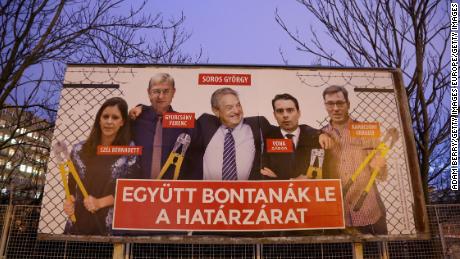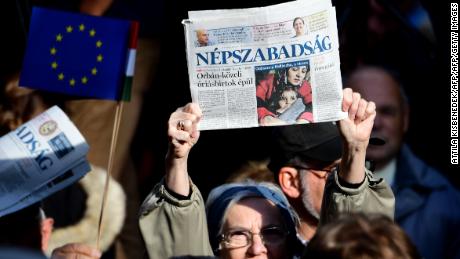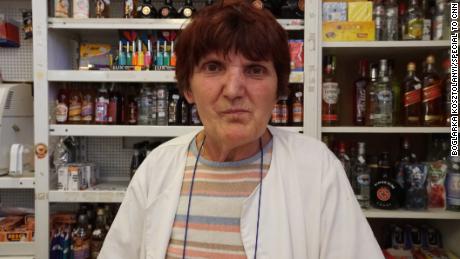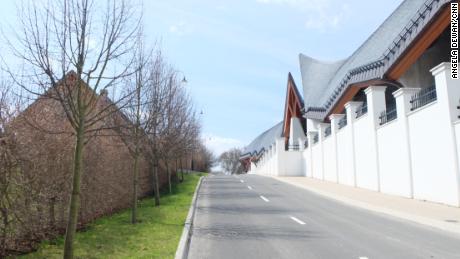Hungary is starting to look a bit like Russia. Here’s why

Hungary, a member of the European Union and NATO, is no autocracy, but after eight years of Orban's rule, its political system has begun to resemble Russia's.The space for civil society and a functional independent media in Hungary is shrinking rapidly. A law passed in 2011 redrew the lines on the electoral map, in what opposition parties and the media criticized as blatant gerrymandering.Orban, 54, has made no secret of his admiration for Russia's political system. He has proudly described his vision for Hungary as an "illiberal democracy," a phrase that brings Russia's "sovereign democracy" to mind, both euphemistic terms for an autocratic style of governance.Orban served first as prime minister from 1998 to 2002, but it was after he was again elected in 2010 that he and Putin began meeting annually. And like Putin, Orban has surrounded himself with a powerful group of businesspeople. He has also come under scrutiny for awarding contracts to a small number of businessmen and family members, according to a Reuters analysis. His spokesman, Zoltan Kovacs, brushed off these allegations to CNN, saying it was "up to the courts to decide" in such cases.Ironically, Orban launched his political career in 1989 with a hard-hitting speech demanding that Soviet forces leave the country after more than 40 years of occupation."For two decades, Orban was probably the staunchest anti-Russian politician in the whole of Eastern Europe," said Andras Racz, a Russian expert and senior research fellow at the Centre for Strategic and Defense Studies in Budapest.That all changed when he was elected for the second time in 2010, when his public rhetoric on Russia began to take on a positive tone.In a recent report looking at Russian meddling in Austrian, Czech and Hungarian elections, the Budapest-based Political Capital research institute said Hungary was the most vulnerable of the three countries. "Hungary represents a case where the government has enabled space for Kremlin interference to shore up its own political strength, which is largely based on anti-migrant and anti-European integration policies," the report says.Kovacs dismissed the idea that Russia wielded influence on Orban or his government as "stupid.""There's not one element of our policies that can suggest to you that we're closer to Russia or Mr. Putin in any way than any Western European country," he said.
Russia's playbook
But some of Hungary's new policies look like they're straight out of Russia's playbook.Hungary passed a law last year that imposes restrictions on nongovernmental organizations receiving foreign funding. The law looks almost identical to Russia's Foreign Agent Law, which has been used to crack down on opposition voices and independent media.The Hungarian law requires NGOs receiving more than 24,000 euros from foreign entities to register with the government and disclose their sources. Orban has argued it is necessary for transparency and to stamp out money laundering, but Hungarian NGOs see it as an attempt specifically to target organizations funded by billionaire philanthropist George Soros. Soros's Open Society Foundations has been banned from Russia, which sees the organization as a security threat. The Hungarian government has since last year vilified Soros in countless billboards across the country. One pictures him with opposition party leaders, and another says, "Let's not allow Soros to have the last laugh!" Peter Szijjarto, the country's foreign affairs minister, defended the campaign, labeling Soros a "national security risk," in a statement. He accused the financier of wanting to demolish a border security fence and "settle hundreds of thousands of illegal immigrants in Europe and Hungary." Soros's spokesman said his views have been misrepresented. Soros was born in Hungary to a Jewish family and fled to the UK in the 1940s to escape Nazi occupation. He later immigrated to the United States, where he became one of the world's richest investors and a philanthropist. In fact, it was thanks to a Soros-funded scholarship that Orban was able to study at the University of Oxford.The anti-Soros campaign sits uncomfortably close to a resurgence of anti-Semitism in the country, which has entered Hungarian politics in parliamentary debate.Kovacs told CNN that while Hungary must allow open borders to EU citizens as a member of the bloc, it did not want any migration at all beyond that. He praised Hungary's border fences with Serbia and Croatia, built in 2015 specifically to keep asylum seekers out.
Peter Szijjarto, the country's foreign affairs minister, defended the campaign, labeling Soros a "national security risk," in a statement. He accused the financier of wanting to demolish a border security fence and "settle hundreds of thousands of illegal immigrants in Europe and Hungary." Soros's spokesman said his views have been misrepresented. Soros was born in Hungary to a Jewish family and fled to the UK in the 1940s to escape Nazi occupation. He later immigrated to the United States, where he became one of the world's richest investors and a philanthropist. In fact, it was thanks to a Soros-funded scholarship that Orban was able to study at the University of Oxford.The anti-Soros campaign sits uncomfortably close to a resurgence of anti-Semitism in the country, which has entered Hungarian politics in parliamentary debate.Kovacs told CNN that while Hungary must allow open borders to EU citizens as a member of the bloc, it did not want any migration at all beyond that. He praised Hungary's border fences with Serbia and Croatia, built in 2015 specifically to keep asylum seekers out.
Orban's control of the media
Journalist Anita Komuves, 35, says she is targeted by the government on two fronts — first because she's a reporter and second as someone who works for an NGO receiving funding from Soros.Komuves worked for Hungary's largest opposition print newspaper, Nepszabadsag, for 11 years before it was shut down suddenly in 2016. She found out about the closure from a news alert on her phone.The government denies shutting it down, but Komuves says that it "was obviously a political decision.""It was because we uncovered too many stories about corruption."The company that owned the newspaper, Mediaworks, was sold just weeks later to Lorinc Meszaros, a close Orban ally. "This way, they took over TV channels, several radio channels, the biggest news portal, a few weekly magazines and the entire regional media outside Budapest," Komuves said. Komuves thought about leaving her profession, but she found a job with Atlatszo, an NGO of journalists, hackers and lawyers, one of the few remaining independent media organizations left in the country In a recent article, she argued that while there was evidence of Russian trolling and fake news sites in Hungary, Moscow didn't need to try particularly hard to influence the vote, because Orban and his government already lean toward Moscow and they lead in the polls.State media has also expanded under Orban and is working as a propaganda machine, Komuves said. It has picked up a significant number of news stories by Russia's Sputnik and Russia Today, both widely considered mouthpieces of the Russian government.Orban has also used the law to clamp down on the media, spearheading legislation that established a new parliament-appointed media control body that fined media outlets for "imbalanced" news coverage, or content that the body considers "insulting" to the majority. The financial crisis of 2008 left many media organizations open to takeovers. Around 90% of Hungary's media is now either directly or indirectly controlled by Orban's Fidesz party, according to Marius Dragomir, director at the Centre for Media, Data and Society at the Central European University's School of Public Policy. Writing in a blog post for the London School of economics, he described the situation as "a classic case of media capture."The widely watched TV2 was bought by a Hungarian-American former Hollywood producer, Andy Vajna, who had worked in Orban's government. He won the procurement in a legal battle against Lajos Simicska, a media tycoon and friend-turned-foe of Orban.Swaths of local media were also bought up by Meszaros, an Orban ally who rose from working as a gas fitter to become a wealthy businessman and the mayor of the town where Orban was born, Felcsut.
Komuves thought about leaving her profession, but she found a job with Atlatszo, an NGO of journalists, hackers and lawyers, one of the few remaining independent media organizations left in the country In a recent article, she argued that while there was evidence of Russian trolling and fake news sites in Hungary, Moscow didn't need to try particularly hard to influence the vote, because Orban and his government already lean toward Moscow and they lead in the polls.State media has also expanded under Orban and is working as a propaganda machine, Komuves said. It has picked up a significant number of news stories by Russia's Sputnik and Russia Today, both widely considered mouthpieces of the Russian government.Orban has also used the law to clamp down on the media, spearheading legislation that established a new parliament-appointed media control body that fined media outlets for "imbalanced" news coverage, or content that the body considers "insulting" to the majority. The financial crisis of 2008 left many media organizations open to takeovers. Around 90% of Hungary's media is now either directly or indirectly controlled by Orban's Fidesz party, according to Marius Dragomir, director at the Centre for Media, Data and Society at the Central European University's School of Public Policy. Writing in a blog post for the London School of economics, he described the situation as "a classic case of media capture."The widely watched TV2 was bought by a Hungarian-American former Hollywood producer, Andy Vajna, who had worked in Orban's government. He won the procurement in a legal battle against Lajos Simicska, a media tycoon and friend-turned-foe of Orban.Swaths of local media were also bought up by Meszaros, an Orban ally who rose from working as a gas fitter to become a wealthy businessman and the mayor of the town where Orban was born, Felcsut.
Orban's football obsession
It was one of Meszaros's companies that built a large football stadium right across from Orban's childhood home in Felcsut.It seats 3,500 people in the town of just 1,600, and has been ridiculed in independent media as a vanity project for the soccer-obsessed leader.Besides the stadium, there is little going on in Felcsut. Along a dusty stretch of road there are two small grocery stores, a rundown coffee shop and a tobacconist.The stadium represents much of what Hungarians are becoming frustrated with — corruption allegations have begun to spread through Orban's government and questions are regularly raised about the way lucrative government contracts are awarded.  Janosne Abraham, a 59-year-old woman who works at the larger of Felcsut's two grocery stores, is vocally critical of Orban."Where is all the money? He just steals it all and doesn't spend it on anything useful, like healthcare," she said."That football stadium is a waste. It costs so much to light up and clean, and it hasn't brought in money for the town."Abraham isn't happy about Orban's relationship with Putin either.
Janosne Abraham, a 59-year-old woman who works at the larger of Felcsut's two grocery stores, is vocally critical of Orban."Where is all the money? He just steals it all and doesn't spend it on anything useful, like healthcare," she said."That football stadium is a waste. It costs so much to light up and clean, and it hasn't brought in money for the town."Abraham isn't happy about Orban's relationship with Putin either. She points to a nuclear power plant project that Hungary awarded to Russia's state-owned Rosatom,saying that she was worried her country would become too dependent on Russia for energy. The project was controversial because Hungary awarded the contract to Rosatom without a tender process and without revealing its costs to the state budget. The European Commission originally opposed the funding plan, which involved a 10 billion-euro investment from Russia, but after an investigation it gave it the green light.Kovacs defended the government's process, saying that only Russia had the experience and the technology to carry it out. He denied there was anything opaque about it.But even for those fed up with Orban, there are few feasible alternatives. The opposition is fragmented and no other party appears to have a real chance of winning.A woman with her children playing on the street in Felcsut said she would vote for Orban's party because, "This town is all Fidesz. It's better to stay silent and not get into conflicts."She is disappointed with allegations of government corruption, but she points out Orban's government wouldn't be Hungary's first to misuse funds. "They're all the same."
She points to a nuclear power plant project that Hungary awarded to Russia's state-owned Rosatom,saying that she was worried her country would become too dependent on Russia for energy. The project was controversial because Hungary awarded the contract to Rosatom without a tender process and without revealing its costs to the state budget. The European Commission originally opposed the funding plan, which involved a 10 billion-euro investment from Russia, but after an investigation it gave it the green light.Kovacs defended the government's process, saying that only Russia had the experience and the technology to carry it out. He denied there was anything opaque about it.But even for those fed up with Orban, there are few feasible alternatives. The opposition is fragmented and no other party appears to have a real chance of winning.A woman with her children playing on the street in Felcsut said she would vote for Orban's party because, "This town is all Fidesz. It's better to stay silent and not get into conflicts."She is disappointed with allegations of government corruption, but she points out Orban's government wouldn't be Hungary's first to misuse funds. "They're all the same."
Original Article
[contf]
[contfnew]

CNN
[contfnewc]
[contfnewc]


